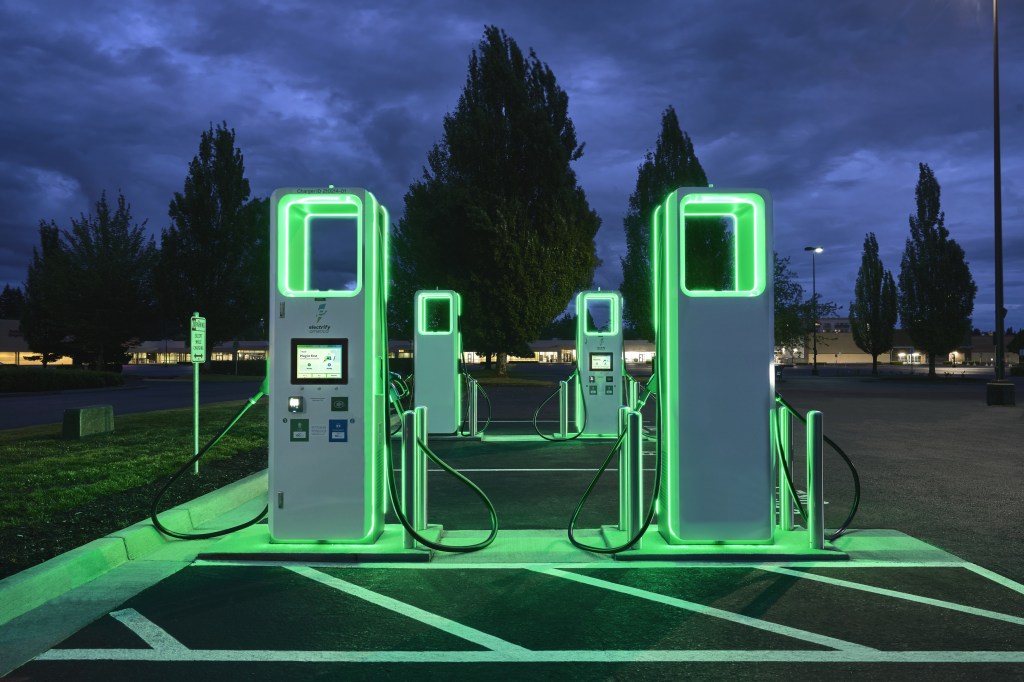Sometime in 2024, maybe as early as February, half a dozen electric vehicle charging companies will face a reckoning.
For years, they had little competition except for each other, which is to say, not much. Soon, though, they’ll have to contend with Tesla’s much-lauded Supercharger network.
The EV world, from a charging perspective, was previously split in two. There was Tesla and then there was everyone else. Tesla owners enjoyed widespread, speedy and reliable charging. Everyone else made do by cobbling together accounts from a number of different companies, none of which could boast reliability ratings anywhere near that of Tesla’s.
Then, in May, the wall fell. Ford signed an agreement with Tesla to give its EVs access to 12,000 Superchargers, a subset of the network. Starting in 2024, existing owners will be able to charge at those stalls by using an adapter, and in 2025, Ford said its future EVs will swap the Combined Charging System (CCS) plug for Tesla’s plug, also known as the North American Charging Standard (NACS).
Other automakers soon followed suit. GM was next, then Rivian, Volvo, Mercedes, Nissan, and pretty much everyone else. One of the last to adopt the plug was Volkswagen, which isn’t a surprise given its majority ownership of Electrify America, which was supposed to be the CCS equivalent of the Supercharger network.
Why automakers are rushing to adopt Tesla’s NACS plug and what it means to drivers
EV owners like myself had —and still have — high hopes for Electrify America. The company was founded out of the Volkswagen diesel settlement, and it was the first non-Tesla network to prioritize nationwide DC fast charging at speeds that could support modern EVs. When Electrify America’s best chargers work, they are indeed fast, faster even than the majority of Tesla’s Superchargers.
But the reality is that they don’t always work. Charging equipment is beset by software faults, broken screens, busted plugs, overheated transformers and more. And it’s not just Electrify America that has these problems; pretty much everyone but Tesla does, too. While Supercharger users encounter problems about 4% of the time, drivers at other fast chargers are left without charging 20% of the time, according to a J.D. Power survey.
It’s a curious state of affairs. There are hundreds of thousands of EVs roaming the country that have had to use one of the half dozen or so non-Tesla fast-charging networks. That should be enough to foster a competitive market, one that raises the stakes among companies, forcing them to improve their offerings to attract more customers. Yet anyone who has had to use one of their DC fast chargers knows that competition hasn’t done much to elevate the field.
There are a myriad of possible explanations why. For one, charging networks have received piddling support from car manufacturers. (I’m not counting the $2 billion Volkswagen used to found Electrify America because the automaker didn’t have much of a choice, and it hasn’t invested that much more since.) Automakers that aren’t named Tesla were happy to leave thorny charging questions to third parties to sort out. Yes, some inked deals with Electrify America and others to offer some free charging to new buyers, but no, it wasn’t enough to compete with Tesla.
It’s also true that building a successful network isn’t easy. It requires real estate savvy to identify prime locations and negotiate leases. It demands robust electrical engineering and cost controls to produce reliable charging equipment that won’t break the bank. And it absolutely needs a committed and responsive maintenance team to keep everything up and running.
Tesla underwrote much of its Supercharger network with EV sales, something Electrify America, ChargePoint, EVgo and others didn’t have the luxury of doing. The Superchargers convinced wary buyers that they could easily drive their Teslas cross-country without getting stranded, and those sales generated enough profits to build and maintain thousands of Superchargers.
Automakers have begun to recognize the folly of leaving charging to others, which has resulted in an unreliable patchwork of software and hardware. It’s why nearly all of them have signed with Tesla to gain access to Superchargers.
In 2024, both Tesla and its fast-charging competitors will be tested. The Supercharger network will see an influx of new users, possibly straining the network to the point where its famed availability and reliability suffer. The others will face their first true competitor, a network that is widely distributed and extremely well run. In response, they’ve begun adding NACS plugs to their chargers in the hopes of wooing some Tesla owners. It’s possible that’ll help offset some losses from Ford, GM, and other drivers who will undoubtedly favor Superchargers.
Electrify America and ChargePoint are among those making some effort to up their game. Already Electrify America has started filling in gaps in its network, while ChargePoint opened a new network operations center in an attempt to improve station uptime.
It’s possible that will help stem the tide of drivers defecting to Superchargers. Possible, though not likely.
At this point, however, the other networks are already years behind Tesla. They might get it together, but they’ll be swimming against the current. Many drivers’ future charging sessions — and money — are probably going to be headed elsewhere.































Comment